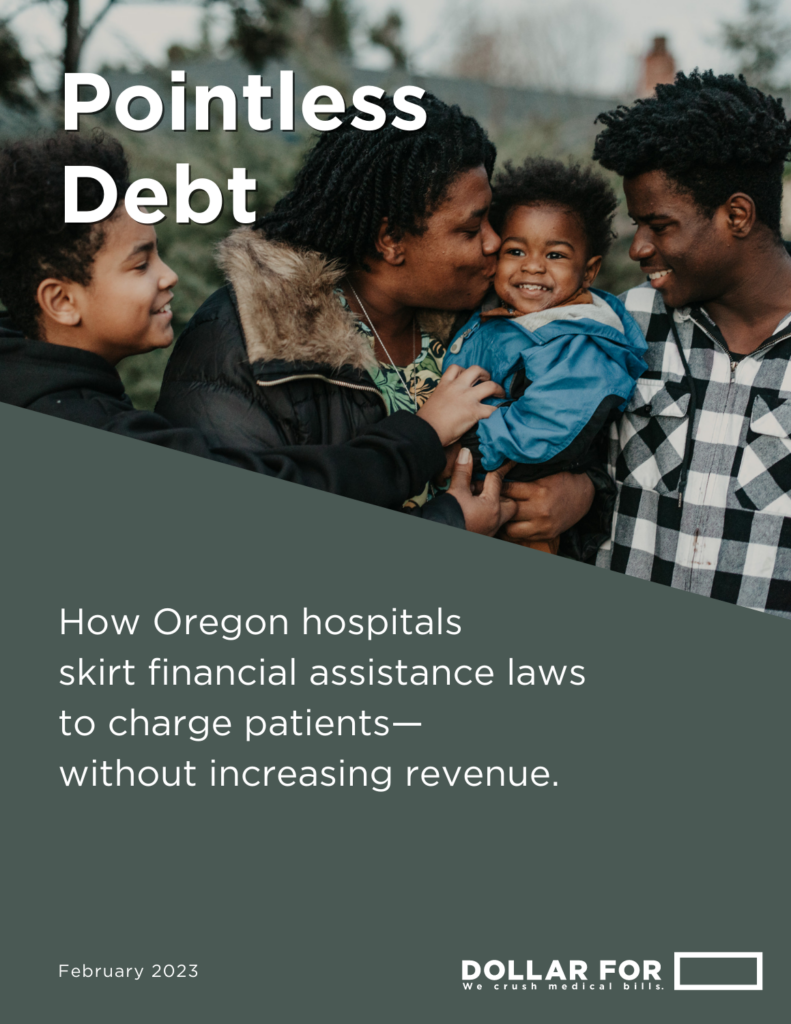In February 2023, Dollar For released “Pointless Debt: How Oregon hospitals skirt financial assistance laws to charge patients—without increasing revenue.” This report is the summation of months of research to explore the impacts of Oregon’s charity care law for both patients and hospitals. The result is a scathing analysis of how hospitals have failed to implement the law and how patients are being hurt by pointless medical debt.

Executive summary
In 2019, Oregon passed House Bill (“HB”) 3076, which set out a comprehensive plan to get financial assistance into the hands of patients. The law initially gives patients the responsibility of requesting financial assistance from the hospital by submitting the relevant documentation. However, the burden is then on the hospital to screen the patient, regardless of whether or not they’ve applied, to determine eligibility. This screening must take place before the hospital can refer the patient’s debt to a debt collector and before interest can be charged to the account.
Dollar For conducted a data-driven evaluation of the Oregon case filing system (OJCIN), public hospital financial data, and federal hospital tax filings. It found that Oregon hospitals have not adequately implemented HB 3076 and are pointlessly suing thousands of patients. Out of 60 Oregon hospitals, 42 of them granted less financial assistance the year after HB 3076 went into effect than the year before. Many Oregonians meant to be protected by HB 3076 were sent to debt collectors and sued in Oregon small claims courts, a venue where the overwhelming majority of defendants do not have lawyers and lack the means to defend themselves. To add insult to injury, this practice does not appear to have increased hospital revenue.
Dollar For examined the relationship between financial assistance, bad debt, and net patient revenue for the top five hospitals that increased their financial assistance giving the most after HB 3076 became law. It found that over an 11-year period, increases in financial assistance reduced hospital bad debt but had no meaningful effect on net patient revenue. In other words, when hospitals increase their financial assistance they reduce bad debt, but their overall profitability seems unaffected.
This report concludes that most Oregon hospital financial assistance programs are not compliant with the law, fail to bring in hospital revenue, and leave thousands of patients with court judgments for medical debt they cannot and should not have to pay.
Dollar For recommends that hospitals screen patients for financial assistance far earlier in the treatment process. It also recommends hospitals adopt modern submission technology such as secure online portals and move away from requiring patients to fax or hand-deliver applications. Finally, Dollar For urges hospitals to stop considering it the patient’s responsibility to ask for financial assistance. Instead, hospitals should recognize that their profitability is unaffected by granting financial assistance and, for the good of their community, they should take it upon themselves to screen as many patients as they can.
Quick facts
- 42 out of 60 Oregon hospitals gave less financial assistance after HB 3076 went into effect.
- An estimated 4 in 9 patients sued for medical debt are entitled to have their bill written off.
- Patient self-pay amounts only account for 1.6% of hospital revenue.
- Hospital data show that increased financial assistance giving reduces bad debt but has no meaningful effect on profitability.
